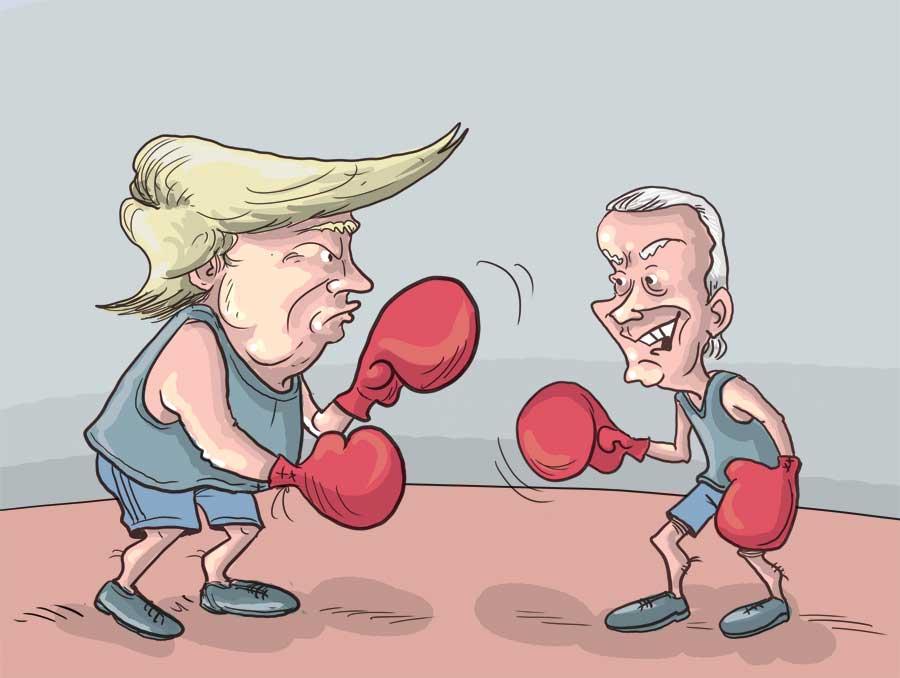09 Nov 2020 - {{hitsCtrl.values.hits}}

In the early hours of Sunday (November 8) morning, CNN announced the projected victory of Joe Biden as the 46th President of the United States. The tumultuous US election campaign had finally come to an end.
Thousands of Americans took to the streets, cheering, honking horns and banging pots and pans and Joseph R. Biden 77, has now been elected -in an election played out in the background of the coronavirus pandemic, its economic fallout and a US caught in the middle of racial struggle.
Biden’s road to the White House has lasted 45 long years. A combination of family and personal tragedy, his own political missteps and sheer bad timing, had never allowed him to take up the reins as president of the US himself. Today’s (November 8) victory brought out the truism of the old adage ‘failures are the pillars of success’ - Biden having twice before run unsuccessfully for the highest office. In a surprising coincidence, it was 48 years to the day, that he was first elected to the United States Senate in his home state of Delaware.
From the inception of his campaign on April 25, 2019, Biden presented himself as an experienced legislator with an ability to understand and share the feelings of the other -an elder statesman best suited to defeat what he termed the “dangerous” and “divisive” President Trump and a promise to “restore the soul of a divided nation. In his first speech as President-elect, Biden said he hoped to unify the nation after an especially bitter campaign with President Trump.
The former Vice President repeatedly sought to reinforce his message during the campaign, that he would seek to be a President for all Americans, regardless of whether or not they had voted for him. President-elect Biden also pledged to be a President who sought to unify not to divide.
But does the US President-elect have the will or capacity to implement such a policy? Statistica.com reveals, in 2019, around 33.98 million Americans were living below the poverty line in the United States. Can Biden make changes to drastically alter the future for these millions of people?
Dependent as the President-elect is - or for that matter any US presidential candidate - on big business interests to run their campaigns, there is little chance Biden will be permitted to make any significant change which will better the status of these people. Capitalism’s need for a large pool of poor people to enhance profits, will ensure no major change occurs. The western allies of the US (antagonized by Trump) within the North Atlantic Treaty Organisation (NATO), will probably have heaved a collective sigh of relief as it became clear the incumbent President was on the brink of defeat.
For Asia, the regime change in the US, will to an extent help calm tensions fuelled by the past US regime’s inability to act as a peace broker between nuclear armed India and China and has worsened the situation by adding fuel to fire, in an already tense situation.
And what does the regime change in the US make to us Sri Lankans? The US, whether under a Republican or Democrat President, has from the time of independence sought to interfere in the affairs of this country.
In 1952, Sri Lanka was adversely affected by a worldwide rice shortage as well as a severe drop in rubber prices due to the introduction of synthetic rubber. Lanka was on the brink of starvation. At this time China very generously offered 40% higher than the market price for Sri Lankan rubber, and 1/3rd of the market price for rice to Sri Lanka. The two nations entered into what was known as the rubber-rice barter agreement.
The US expressed its opposition to the agreement. It said China was a communist country and threatened to block aid if the deal went through. The signing of this agreement led to US revoking aid to Sri Lanka.
Again in 1961, in reaction to Sri Lanka’s nationalization of its petroleum industry, the US once again blocked aid to the country. Most recently during Sri Lanka’s ‘War on Terrorism,’ the US sanctioned arms sales to the country. When Sri Lanka’s ‘War on Terrorism’ led to the successful defeat of the terrorist organization, the US pursued a vigorous anti-Sri Lanka policy in the United Nations, charging Sri Lanka with war crimes and crimes against humanity. In this background, it is difficult to see any change in the US attitude toward Sri Lanka under Biden Presidency.
30 Nov 2024 3 hours ago
30 Nov 2024 4 hours ago
30 Nov 2024 7 hours ago
30 Nov 2024 9 hours ago
30 Nov 2024 30 Nov 2024